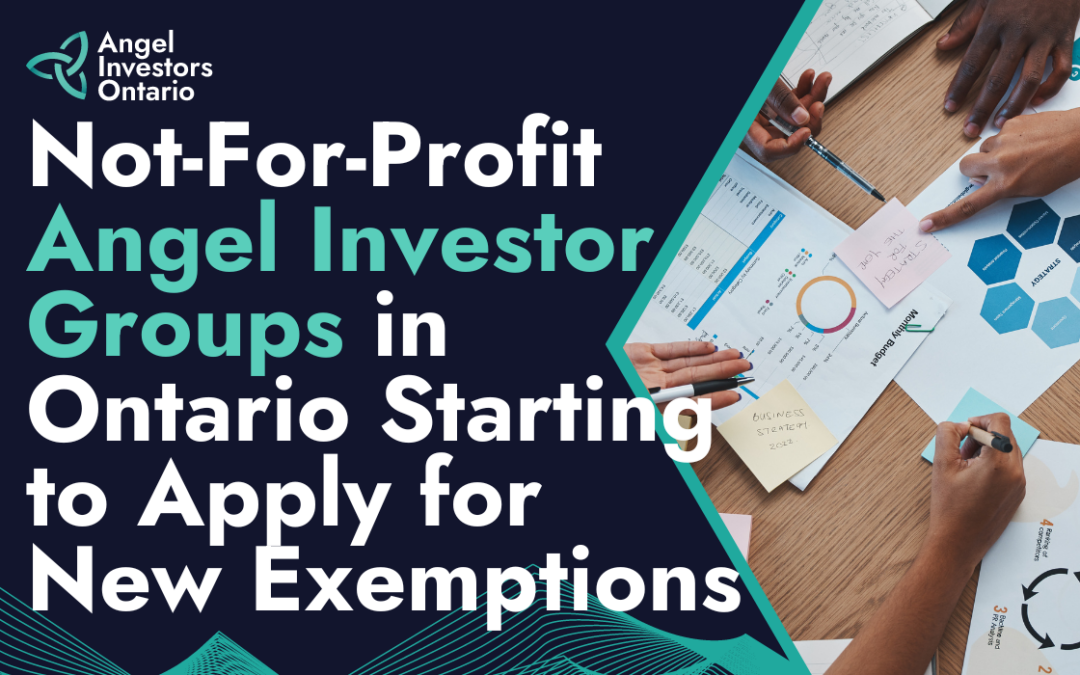Please note that the information provided in this article is for informational purposes only and should not be considered as legal or financial advice.
Angel investor groups under the umbrella of Angel Investors Ontario are now being able to apply for a new exemption from some securities dealer registrations while operating and helping to facilitate the financings of Ontario-based early-stage businesses, or those businesses who have a large operation in the province. The new 18-month trial program called the “32-508 Not-For-Profit Angel Investor Group Registration Exemption”, was created by the OSC’s TestLab to enhance capital formation in Ontario. The applicable angel investor groups (AIG), simply apply for the exemption, and is not meant to be a legal-intensive or fee-based application.
Angel groups in Ontario have been looking for ways to subsidize the operating costs of their groups as government funding is diminishing and sustainable funding alternatives are being pursued. Angel groups that apply, who meet the criteria, are then able to if they wish, charge early-stage companies a presentation fee and a success fee on funding of up to 5% of proceeds (a transaction-based fee). In addition, the OSC exemption allows the groups to share due diligence materials with other angel groups. Without this new exemption, the charging of a fee would indicate that the group needs to be fully registered as a securities dealer. Charging a transaction-based fee, under most any country’s securities’ regulations, is the test for requiring that full registration. The OSC exemption if quite unique in this regard.
Incubators and accelerators in Ontario, that meet the same operating criteria as above, are also able to apply for the similar exemption as a means to generate fees to offset operating costs and avoid costly full dealer registration. The exemption gives comfort to the abiding organizations to operate within the four corners of the exemption, without registration.
Applicable angel groups have now been filling out “Form 32-508, Angel Investor Gorup Information Form” to disclose some basic details of their angel investor group. This OSC form submission is what is needed to be able to start using the exemption. The exemption is otherwise not automatically applied, nor is a group mandated to use the exemption.
The OSC, who reports to the Minister of Finance, is also indicating that an annual submission of Form 32-508 is required, which includes the submission of the group’s financial statements (no audit required), and certain metrics on its activities over the past year on outreach, breadth of operation, financing successes, sector activity , and number of early stage companies vetted and or exited from over that period. This is a great chance to showcase to the OSC and Government all of the great work that AIO and its groups do to help innovation businesses in Ontario. As this is a TestLab program, and the government is a metrics-based organization for future program funding allocation and program creation and alteration, it is in the best interests for the angel groups to do their best efforts to provide the metrics they can reasonably acquire. The OSC is looking forward to analyzing that data to make future regulations that continue to enhance capital formation in Ontario.
Angel groups help identify and introduce early-stage businesses seeking capital and help facilitate the information flow of those businesses to its Accredited Investor (AI) members. In addition, the groups have regular meetings to let the businesses present to its members which further allows those members to engage in due diligence. Each angel member then creates their own investment thesis and decision to invest or not, as the group never provides any investment opinions. Finally, the groups also facilitate investor educational resources. The provision of the infrastructure for convening the screening of early-stage businesses and holding the monthly investment meetings requires the groups to seek funding outside that of annual membership fees. The above-mentioned ability to charge transaction-fees to the early-stage businesses helps to offset the costs of the group’s administration and no person would collect compensation tied directly to a particular deal. A large part of an angel group is also run by volunteers who are constantly mentoring both prospective and invested-in early-stage businesses.
For more information visit OSC!

Written by Mark A. Lawrence P.Eng., MBA, CFA is Executive-Chair of Angel Investors Ontario, and Managing Director of NorthCrest Partners Inc, a registered Exempt Market Dealer (EMD) in Ontario.
